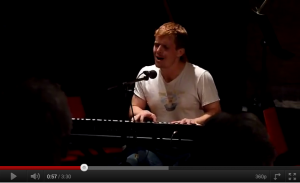Another in a series of stories for liberal religious kids. This is my adaptation of a hymn from the Rig Veda (book 10, hymn 90). Notes and discussion at the end.
Before the beginning of all things, a giant being named Purusha existed. Purusha had thousands of heads, and thousands of eyes, and thousands of feet. He was huge and embraced the earth on all sides; and at the same time he filled a space only ten fingers wide, the size of the space which holds a human soul. Purusha was the Primeval Man, the man who came before all human beings.
Purusha was everything, all that had once been, and all that which shall be in the future. He was the god of immortality, and he now lives through sacrificial food which humans offer up to him. All beings and creatures make up one quarter of him; the rest of him is immortal life in a world beyond this world. The three quarters of Purusha which are immortal life rose up high, and the remaining one quarter of him remains here on earth.
Before the beginning, Purusha gave birth to his female counterpart, who was named Virat. When she was born, she took the form of an egg. And then Virat in turn gave birth, and she bore her male counterpart, Purusha. Continue reading “The hymn of Purusha”

